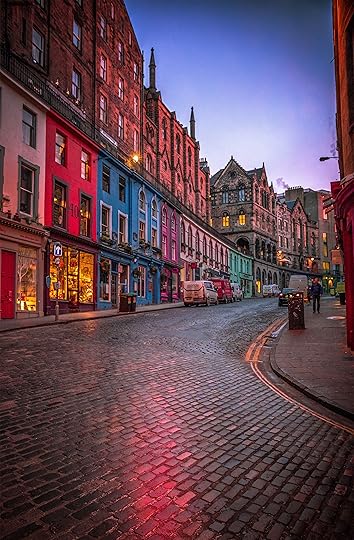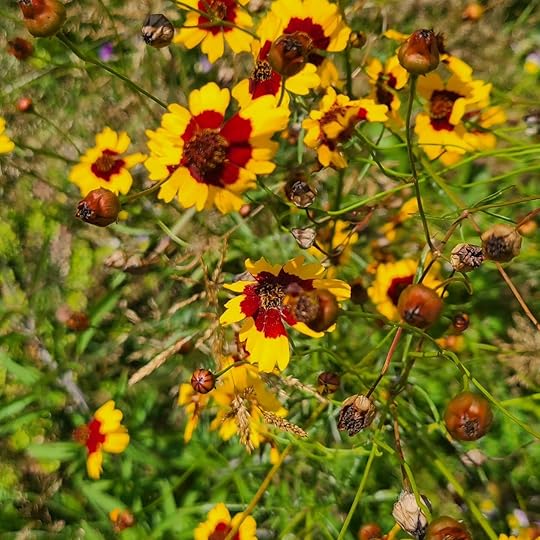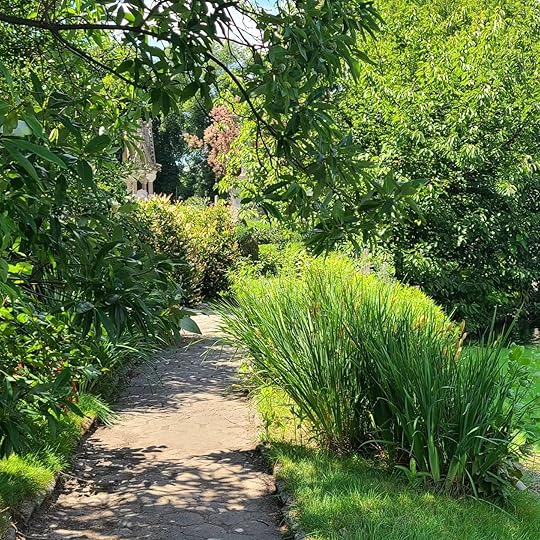Christa Avampato's Blog, page 25
September 1, 2023
The possibility of September
 Photo by Elena Mozhvilo on Unsplash
Photo by Elena Mozhvilo on UnsplashSweet September. Let this be a month to remember, when we dug deeper, rose higher, and found a way forward. And if we find that there is no way, then let’s build the courage, commitment, and community to make one. There is so much in our world, and often in ourselves, to revitalize, regenerate, and renew.
I see September as my new year, a time when what is worn falls away so that new seeds for new beginnings can be planted. Not all of them will take root. Some relationships will fizzle. Some tasks, or even whole jobs and vocations, will no longer hold our attention. The place we have called home may feel less like one.
When this happens, there’s a bit of mourning, maybe even some regrets. The wouldas, couldas, and shouldas will start making themselves known and heard. It’s okay to have a listen, and then decide what lessons we’ll take with us into the next harvest. Sime of the seeds to planted with begin to reach for the light. Those are the ones that deserve our attention.
In time, we’ll find our rhythm again. We’ll meet someone new or see someone we’ve known in a new light. We’ll discover or rediscover the work that lights us up. We may even find that home is not a place at all, but a feeling, a sense of self we can take with us anywhere and everywhere we go.
This September I hope our lives are filled with love and joy and peace, and that we will find all the ways to make it so for ourselves and others. Happy weekend.
August 30, 2023
Fun and play are a part of work
 Photo by LI FEI on Unsplash
Photo by LI FEI on UnsplashFor my University of Cambridge dissertation, I’ve been thinking about ways to bring my passion for biomimicry into the research without causing my own scope creep. Now deep into my literature review reading, I found a way to not only avoid scope creep but to use biomimicry and my intense love for nature-based solutions as a way to focus my dissertation. I’m so firmly planted in my happy place now that the hours of work fly by until my sweet old dog toddles over to my desk to tell me it’s time to go out for a walk.
Charles Darwin, legendary naturalist and Cambridge alum, is one of my fun at work icons. He wrote tens of thousands of personal letters over the course of his lifetime. (A collection of the 15,000 that have been found to-date are accessible in the University of Cambridge’s collections). What those letters communicate that his formal academic writing does not show is that his work was so much fun for him that it felt more like play. If Darwin can have fun while doing his research, then I can, too.
So whatever you’re doing today from wherever you are in the world, I hope you’re having fun and that your work lights you up in a way that also lightens your spirit. It’s not too much to ask.
I’ve had moments in my career when my work felt like drudgery. I’m really glad and grateful that I made the changes to change that. It wasn’t easy but for me it was worth it.
August 29, 2023
Enric Sala’s passion and advocacy for the ocean
 Enric Sala, NationalGeographic Explorer in Residence and Pristine Seas Founder, is seen exploring the reefs in Palau. Manu San Félix — National Geographic Pristine Seas
Enric Sala, NationalGeographic Explorer in Residence and Pristine Seas Founder, is seen exploring the reefs in Palau. Manu San Félix — National Geographic Pristine SeasEnric Sala is having a moment, and I hope it never ends. His passion for and commitment to the oceans inspires me. In addition to the gorgeous cover story of TIME this week about his work and explorations, the feature on 60 Minutes about his sperm whale research in Dominica’s Nature Island is a must-view.
The stunning footage of these sperm whales instills a deep love and respect for these animals and the ecosystems they inhabit. To see these gentle giants is a spiritual experience. You can’t help but be in awe of their language and beauty. They have the largest known brains to ever exist, upwards of five times the size of a human brain.
“I left academia because one day I realized I was writing the obituary of the ocean,” said Sala. Now with his organization Pristine Seas, he’s offering the cure to heal the ocean, the only cure that has been proven to work: the creation of marine protected areas where all damaging human impacts are illegal and banned.
Oceans underpin our ways of life, our health, and the world economy. The science is proven. We know how to protect and regenerate healthy oceans—leave them alone. Do we have the will to do it? Once we see a sperm whale and all their majesty, how could we not?
August 26, 2023
My dream plan for summer 2024
As the sun begins to set on summer, I’m speaking plans for next summer into existence. I’ll be at University of Cambridge for my final Masters in Sustainability Leadership residency in early July 2024. I’d like to go a bit early to check out beautiful Brighton. Then after my residency, I would stay on in Cambridge to work remotely and finish my dissertation. After I turn it in at the end of July, I’d like to spend August in Scotland for the Edinburgh Fringe and Book Festivals. My dream summer 2024.
What are you dreaming of for next summer?



August 25, 2023
Life lessons from my house plants

I’m a bit ashamed about something: though I grew up on a farm, I’ve been unable to keep house plants alive. Until now! After moving in June to a new apartment with loads of natural light and a steady breeze, my house plants are thriving, sprouting new shoots, and happily reaching up and out. I literally danced around and clapped my hands at this new life growing on my windowsill this morning. What an incredible metaphor for life.
In the words of Taylor Swift, with plants, I always thought, “It’s me. Hi. I’m the problem. It’s me.” Turns out it was the environment the plants and I were in that needed to change. Sometimes, a change of scene is the key to a change of self.
I love new beginnings of all shapes and sizes—new jobs and projects, new adventures and travels, new relationships, new friendships. Even something small like these new shoots from my plants and learning to care for them, starting a new book, or walking through a part of town I’ve not been to in a while (or ever, as I’m learning with my new home in Brooklyn!) gives me a whole new lease on life. There’s energy and inspiration in the new. A beginner’s mindset is a wondrous thing.


To help my plants thrive, I let them tell me what they needed. Water. Lots of light and fresh air. Some music. Room to grow, change, and evolve. We’re not so different.
Perhaps the most important bit I’m thinking of today while looking at my plants is that new growth needs extra support. “The world is often unkind to new talent, new creations. The new needs friends,” as Brad Bird wrote. I don’t know what it is about that new that’s so threatening that some will try their best to stamp it out. I’m always happy to befriend and learn from the new. We need the new now more than ever. In a world where we can be anything, let’s be kind, particularly to those just starting a new journey and especially the natural world. We need each other.

August 24, 2023
At Brooklyn’s Green-Wood Cemetery, the circle of life continues
Brooklyn’s Green-Wood Cemetery is much more than a final resting place for over 600,000 people. It’s also an arboretum, wildlife sanctuary, and a community resource to mitigate climate change where life and death exist side-by-side. A 30-minute walk from my apartment, it’s a place I visit often as I get to know my new borough.
With 478 acres, Green-Wood is home to over 7,000 trees from 690 different species, 216 species of birds (including the Argentinian monk parrots who make their home in the architecture of the entrance gates!), and dozens of species of mammals, fungi, and insects, especially pollinators thanks to their beehives and wildflower meadows. Each new planting is selected for its climate adaptiveness, wildlife value, enhancement of the beauty of the landscape, and resilience. Every year Green-Wood’s living collection is responsible for sequestering 264,000 lbs. of carbon dioxide, removing 12,000 lbs. of pollution from the air we breathe, and mitigating 2,620,000 gallons of stormwater from overwhelming Brooklyn’s sewage system.
Founded in 1838, Green-Wood was Brooklyn’s first public park during a period of rapid urbanization. It became so popular, that it inspired the competition to build both Central Park in Manhattan and nearby Prospect Park in Brooklyn. Olmsted and Vaux won both competitions and designed both parks. After designing Central Park, they said that “Prospect Park is everything we wanted Central Park to be.” How very Brooklyn of them!
Green-Wood is also filled with gorgeous art. Inside the chapel, there’s currently a beautiful art installation paying homage to the stories of lesser known souls who are buried on its grounds. I’ve been to classical music concerts inside the crypt, whiskey tastings on its many sprawling lawns, and a Halloween Party that felt like a New Orleans carnival. It is one of the city’s treasures. No wonder it attracts over 500,000 visitors every year.
I love cemeteries and seek them out when I travel. If you find yourself in New York and want to get a sense of our history, ecology, culture, Green-Wood should be high on your list.
All photos below were taken by me at Green-Wood. You’re welcome to use them as long as they are attributed to me. Thank you.










August 18, 2023
Mitigation and adaptation: How to prepare and protect our natural world in the age of climate change
 Photo by Mike Newbry on Unsplash
Photo by Mike Newbry on UnsplashMy eyes started to fill up watching the footage from Maui, Hawaii. I’ve struggled to put my emotions into words as I poured over the coverage. Nearly 14 years to the day, I lost almost everything, including my life, to an apartment building fire on the Upper West Side of New York City. I know the fear of running for my life, away from flames and into the emptiness of the aftermath. The smell of that noxious smoke is still in my nose and memory. I think it always will be.
I wish I could be in Maui to help. Whether using my logistics and operations experience to get survivors supplies and basic needs, or just being there to comfort people knowing exactly how they feel to have lost everything, I can’t help but think that my life and career could be of use in the midst of this horrible tragedy.
Already Maui’s fires are prompting conversations in the sustainability community. When we talk about sustainability solutions, we look at mitigation (halting and reversing climate change and its impacts) and adaptation (preparing ourselves for the impacts of a warming world on our lives). Now in my second year at University of Cambridge studying sustainability, I’m beginning to formulate my career plans for what comes next. I’m using this mitigation and adaptation split as a frame for my future work:
What can I do to preserve the natural world we have now and rewild, restore, renew, and regenerate what’s been lost? What can I do to prevent the devastation that will continue, and worsen, because of climate change so we protect lives and natural areas? Can I do both, or do I have to choose where I think I can be the most value?My Cambridge dissertation involves securing funding from the wealthiest people in the world to fill the climate finance gap. One thing I’ll test is which of these strategic objectives, mitigation or adaptation, resonates most with these funders. Maybe they’ll also see the value in both. I suspect this research will help me figure out where I fit into the puzzle, and how my skills can best be utilized as we begin the fight for and battle of our lives. I’m ready to take the journey, wherever it leads.
August 17, 2023
How climate change is impacting theater in Italy and around the globe
 A performance of Rigoletto staged in Venice. From Italy Magazine.
A performance of Rigoletto staged in Venice. From Italy Magazine.Here is a fascinating, and incredibly sad, fallout from climate change that I had not previously considered. I manage the streaming movie channel for a world-class arts organization based in New York. We curate the finest concerts, dance, opera, and music-based documentaries from around the globe, and provide them to subscribers in 63 countries.
Recently, we had to pull a performance of Rigoletto from our future lineup because the performance we were planning to record this summer cannot be staged in Italy. Climate change has made it too hot, and it would be unsafe health-wise for the performers, technicians, and audience. Further proof that climate change is having broad reaching impacts on every industry, everywhere.
Over time, this will only grow unless we halt emissions. Even the art we love and look forward to experiencing, and the economic and cultural benefit the arts bring to so many communities around the world, is at risk of disappearing.
August 14, 2023
The genius of NYC’s London Plan trees that can help us thrive
I was worried about my trees. My block in Brooklyn, my whole neighborhood of Ditmas Park, is covered with gorgeous 100+-year-old, 100+-foot-tall London Plane trees. They’re a cross between oriental plane tree and the American sycamore, and so named because they were hardy enough to withstand London’s air pollution during the Industrial Revolution. Its leaf is the NYC Parks Department logo because Robert Moses loved these trees. The comprise 10% of NYC’s 592,130 street trees.
A few weeks ago, during an intense heatwave, they started shedding their bark. And I don’t mean a bit of peeling here and there. It was raining bark, with swaths so big that my dog, Phin, and I had to dodge them on our neighborhood walks. Was the heat, caused by climate change, killing my trees? Were they resilient enough to survive the Industrial Revolution only to be destroyed by the fallout of today’s emissions?
Mercifully, it appears not, for now at least. Thanks to the wonderful team at Madison Square Park I learned this adaptation of bark shedding was developed by London Planes to protect themselves and help them thrive. It happens when they detect some type of enemy invasion, for example by an insect or fungus, or when they are growing, similar to how a snake sheds their skin in order to grow.
Maybe there is something in your life that needs shedding, that is no longer serving you. Like the London Plane, let it go so you can grow and thrive. These trees are our elders, mentors, and guides. We have so much to learn from them about how to live through turbulent times.
I took the photos below of the London Plane trees on my Brooklyn block.






July 30, 2023
The danger of Texas school libraries becoming “discipline centers”
 Photo by Joe Ciciarelli on Unsplash
Photo by Joe Ciciarelli on Unsplash“Libraries are about freedom. Freedom to read, freedom of ideas, freedom of communication. They are about education, about entertainment, about making safe spaces, and about access to information. We need libraries. We need books. We need literate citizens. I hope we can give our children a world in which they will read, and be read to, and imagine, and understand.” ~Neil Gaiman
When I was a kid, the school library was my refuge. I’d go there when I felt bullied, sad, and lost, and I wanted to escape. I would go to books to go into new worlds that weren’t my physical world. Through them I could travel, find adventure, and be anywhere except where I was when my world was not where I wanted to be. I returned stronger, wiser, and braver because of libraries.
As I got older, I realized I was not alone in finding my haven in books and libraries. So many kids all over the country, and all over the world, did the same thing if they were fortunate enough to have a library. I also learned millions of children didn’t have libraries to escape to, and that broke my heart and opened my wallet to support libraries, books, authors, reading, writing, and creating in every way I could. When I became a journalist, then an essayist, and then a novelist, my dedication to libraries, books, readers, and writers grew even bigger.
So it’s with devastation that I learned last week about the dire state of school libraries in Houston, Texas that are part of the Houston independent school district (HISD). Superintendent Mike Miles will turn the city’s school libraries into “discipline centers”, and librarian and media-specialist positions will be eliminated. Teachers will be able to send “misbehaving students” to these centers to learn remotely. This is a state decision, not a city decision, and Miles was given this post by the Texas Education Agency. He thinks this will improve student performance in Texas’s largest school district and the 8th largest district in the country.
HISD has 276 schools and 196,943 students. 90% of students identify as ethnic minorities, and 59.4% are economically disadvantaged. They are students who need libraries, extra educational support, and places of refuge. I know this because I was an economically disadvantaged student. Libraries, librarians, and books saved me. They helped me dream of a better life than I had as a kid, and it’s largely because of libraries, librarians, and books that I have the life I have now, a life I love where I make a living through my creativity every day.
I don’t live in Houston, but I care deeply about these students and what happens to them because they will eventually grow into adults who will go out into our shared world on their own. Without libraries and books, and with goodness knows what goes on in a “discipline center”, imagine how angry and deprived they will be. Imagine how deprived every student in these schools will be without libraries and librarians. What message are we sending all students by denying them free access to books, and the ideas and freedom they afford those who face an unjust uphill climb in our current society?
Here’s my great hope for the HISD and the city of Houston: that the students, administrators, teachers, voters, politicians, and residents will rise up against Mike Miles. I hope they won’t allow students to be deprived of books, reading, and librarians, and I hope all of us outside of Houston will support them in every way they need. The students of HISD deserve better than this policy, and better than Mike Miles. We can’t allow one man to take their books and their futures from them.



